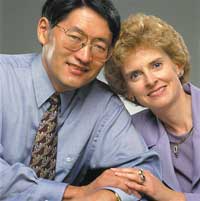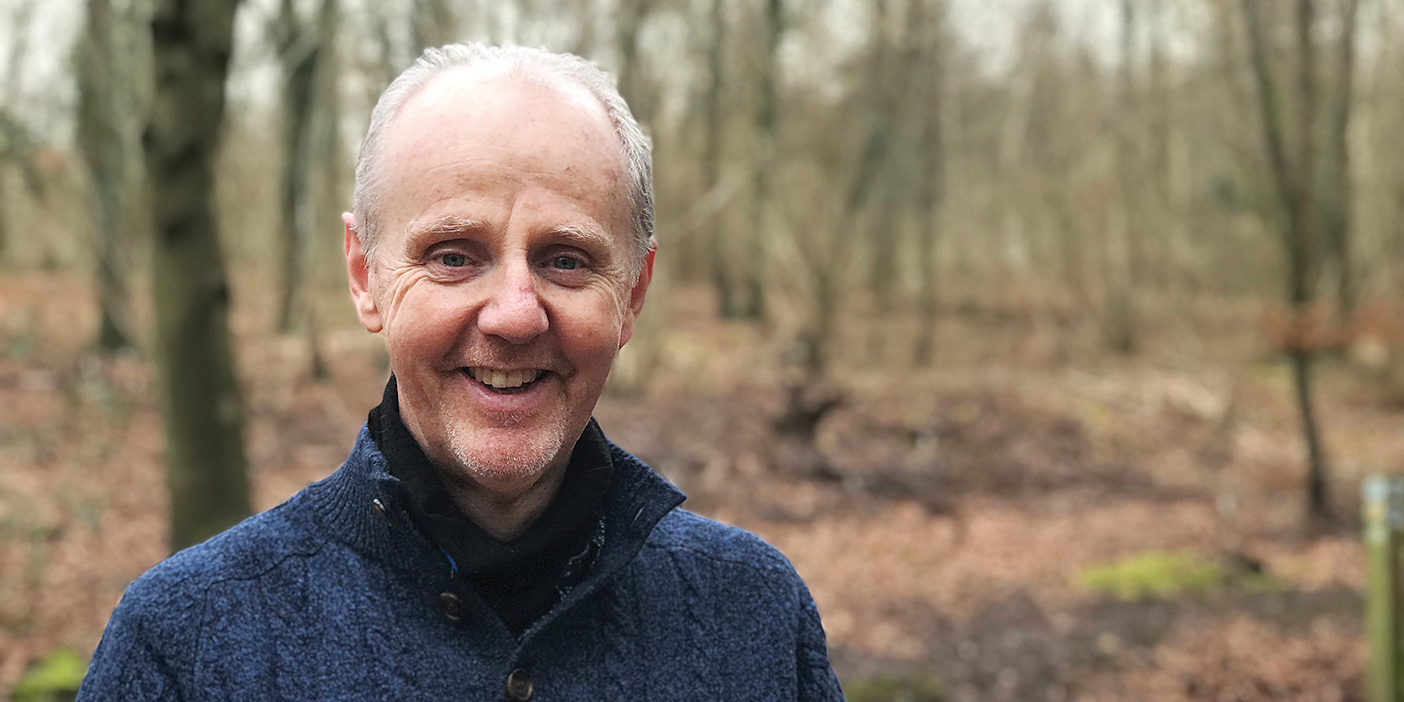
Known nationally for their research on language and social skills – and locally for their tag-team parenting and their skill as mentors – professors Bonnie Brinton and Martin Fujiki work together about as closely as an academic couple can.
By Mary Lynn Bahr
We were assigned as lab partners, so we cut up a cadaver together,” Brinton says. “That’s how we got acquainted.”
It might not have been the most romantic of settings, but for Bonnie Brinton and Martin Fujiki, who were then PhD students in audiology and speech-language pathology at the University of Utah, those first formaldehyde-scented conversations started something wonderful.
“We cooked up a research project together,” Fujiki explains. “We were actually just good friends and colleagues. It wasn’t until years later that we became romantically involved.”
“We were work partners before we were life partners,” Brinton adds.
“And it seemed to me that that really was a good test of whether you could live together, if you could work together,” Fujiki says.
Work together they can and do–constantly and prolifically. Professionally Brinton and Fujiki are about as indivisible as an academic couple can be. Their research goals are so aligned that they never speak of their work in the singular; it’s always “our” work. Neither has published a major paper independently of the other since their marriage. Together they host academic seminars, workshops for school districts, and occasionally a class on campus. And until Brinton accepted her new position as BYU’s dean of Graduate Studies, their offices were almost always down the hall from each other. “Usually we have offices that are not more than three doors apart,” she says. “I had to kind of wean myself.”
Collegial Resonance
“People often say, ‘I could never work with my spouse. How do you do that?'” Brinton says. “And I don’t understand that. I always say, ‘How can you live with someone you can’t work with?'”
Of course, few couples can work together in quite the way Brinton and Fujiki do. For one thing, few couples have such congruent professional interests. Brinton became interested in speech pathology as a child, when her cousin needed speech therapy. Fujiki found the field after he had earned a BA in speech communication, and the move was, he says, serendipitous. By the time he and Brinton met, both were PhD students and child language specialists. Since then it has been natural for their research interests to coincide.
There’s also the matter of their synchronized job changes, which they consider, Brinton says, “near miraculous.” It’s not easy to find (and snag) two job openings at the same university simultaneously even when spouses are in different fields.
But hiring two professors with the same research specialty in the same department at the same time? That rare opportunity has come to Brinton and Fujiki three times. After graduating from the University of Utah they taught at the University of Nevada in Reno. About six years later they were recruited to the Parsons Research Center at the University of Kansas. And in December 1990 they came to BYU. Both were made full professors in 1994.
“They do work together as a team,” says Ronald D. Bingham, professor of counseling and special education and the couple’s longtime friend and colleague. “As department chair I had a hard time sometimes deciding how to recommend salary increases because it was very difficult to determine who did what. But they basically said, ‘We’re not in competition with each other. So if one year one of us gets a larger raise, don’t worry about it.'”
How do Brinton and Fujiki collaborate successfully? Brinton says, “Most of it is being able to put your ego aside toward a common goal. That’s the key.”
Fujiki adds, “You write something and the other person can tell you honestly whether they think it’s good or not.”
“And we never assign any blame to anything,” Brinton says. “It’s our joint work.”
Joint, yes. Effortless, no. Their partnership is not a simple merger of two identical personalities. Fujiki and Brinton are hardly carbon copies of each other.
For one thing, they speak at different speeds. Brinton is quick, vivacious, exuding energy. Fujiki is quieter, calmer, exuding thoughtfulness. She is more likely to take the world by storm, he by gentleness. “But they understand each other’s differences and complement each other,” Bingham says. “They rely on the strength the other can contribute.”
Tag-Team Parenting
As they describe their work and relationship, Brinton and Fujiki transfer the narrative back and forth, sometimes completing each other’s thoughts, telling their story in tandem, the way they do everything else.
“We’re kind of boring people,” Brinton says. “Really, we’re not that interesting.”
She looks at Fujiki, and he begins a story to illustrate her point. “When we met him, Ron Bingham said, ‘What are your hobbies?’ We kind of looked at each other and thought, ‘We should have thought about this and come up with some hobbies.'”
Brinton picks up the narrative. “And I said, ‘We don’t have time for hobbies. We have children. How can anyone with children have hobbies?’ And so when we had our stewardship interviews years after that–see, Ron’s a counselor by trade–he would try to gently counsel me to start to get a life.”
One thing they do make time for is church service. Early in their marriage, Fujiki says, they decided “to devote time to the Church rather than just career. And, you know, I can remember thinking that this was such a big commitment to take all this time away from work.”
“We quit working on Sunday,” Brinton explains.
“And then as we had more and more church responsibilities, it was almost like tithing of your time,” Fujiki says. “We seemed to get more and more blessings.”
Since their marriage, the Brinton-Fujiki partnership has produced years of service to the LDS Church, scads of co-authored publications, a national reputation for scholarly excellence, and most important, their children, Bob and Amanda, ages 12 and 10.
Brinton and Fujiki don’t draw lines between work and family any more than they draw lines between their roles as colleagues and spouses. They work together. At everything. So their home and work spheres constantly converge.
For instance, their children frequently accompany them to campus. “Often Bob and Amanda are to places that you don’t see other children,” Bingham says. “It just shows that their family comes first.”
And their work, centered at the university and invariably involving graduate and undergraduate students, flavors their children’s lives in sometimes humorous ways.
“The night before Amanda started first grade, she started to cry,” Brinton relates. “And I said, ‘What’s the matter?’
“She said, ‘I don’t want to go to college.’
“And we said, ‘Why don’t you want to go to college?’
“‘Cause then you have to take the really hard tests and write a theeee-sis. Waaaah!’
“So we said, ‘Why don’t you get past first grade before you worry about this?'”
The children are party to their parents’ professional decisions as well. Brinton undertook her new role as dean of Graduate Studies after serving for two years as associate dean for graduate studies and research in the School of Education. Accepting a weightier administrative position took some pondering: she loves research and teaching, and family always comes first. The decision to accept was “a joint decision that we had to make with our kids, whether this would be a reasonable thing for me to do,” she says. “I just have enough faith that if I’m supposed to be here, and I think I am, that if this is what the Lord wants me to do, then he’s not going to sacrifice this research program that he’s helped us with this long.”
Speech and Social Skills
For at least eight years, Brinton and Fujiki have focused their research efforts on the intersection of language ability and social skills. Through BYU’s partnership with five local school districts, they have observed and analyzed the social interactions of school children with language impairments.
“Children with language problems frequently have social problems,” Fujiki says. “We’ve done a bunch of studies that show that these kids have poor social skills, that they have fewer friends, they’re more lonely, they don’t interact as skillfully, they tend to get left out, and they’re more withdrawn. Where we’re going to go next is to try to ferret this out a little bit, to see what causes this.”
Brinton continues, “We would like to design intervention programs for kids with language impairments that will help improve their ability to understand and speak and read and write language, and at the same time improve their ability to interact in social contexts to establish and maintain relationships. We’d like to treat these things at the same time so these kids can have nicer lives.”
Such treatment programs are still years away, but in the meantime Brinton and Fujiki’s work is having local and national impact. Ron W. Channell, an associate professor of audiology and speech-language pathology, has known the couple since graduate school. In addition to publishing well-respected research, “They’ve been a tremendous impact here on our department,” he says. “And they’ve gone out of their way to involve undergraduates in research.”
Including students is a high priority for Brinton and Fujiki; most of their recent articles list at least one student co-author. “We work with graduate and undergraduate student teams in all of this,” Brinton says. “So the fact that we collaborate well together makes it, I think, much easier for us.”
“We both feel, really, that we have done work together that is far more than the combined of what we could have done separately,” she says. “There’s a real synergy in this working relationship.”









